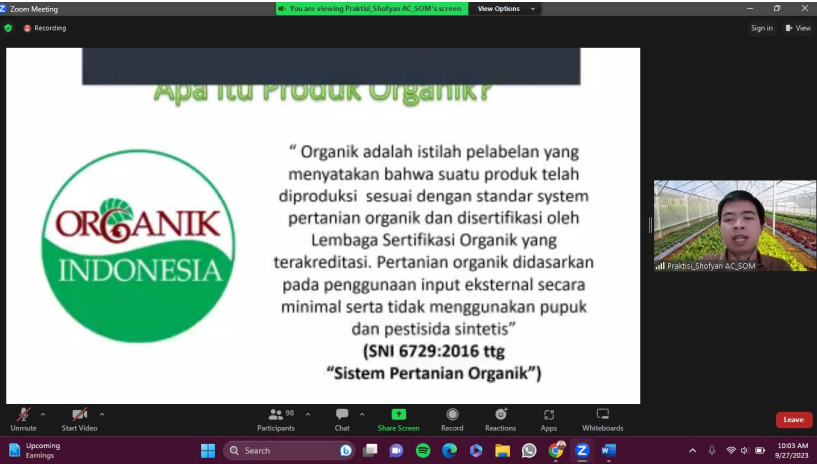
Organic farming is an agricultural system that promotes soil and plant health through various practices, such as using natural materials and recycling organic nutrients, not using synthetic fertilizers and pesticides, and not using engineered fertilizers. The Agricultural Economics and Agribusiness Study Program invited Shofyan Adi Cahyono from Sayur Organik Merbabu for a guest lecture on Wednesday, September 27th 2023 with the theme Efficiency of Organic Farming Business Development.
SOM started its business practice in 2007. Starting from the problem of not having buyers of organic vegetables from farmers on the slopes of Mount Merbabu. The main reasons for the conversion of farmers around the Merbabu slopes include:
– the land is becoming less fertile,
– OPT attacks are getting out of control,
– farmers are vulnerable to illness due to chemicals,
– increasingly expensive prices of fertilizers and pesticides,
– The price of conventional vegetables fluctuates and is manipulated by middlemen
The preparation process for cultivating organic vegetables can be done by:
- Pre-cultivation preparation in the form of facilities and infrastructure to support organic farming cultivation activities
- Preparing natural water sources or using artificial water filtration to minimize contamination from non-organic materials
- Using local organic seeds and suppressing the use of non-GMO hybrid seeds with specific treatments
- Use solid or liquid organic fertilizer and use manufactured fertilizer labeled organic
- Using biological pesticides, planting pest-resistant varieties, and implementing good technical culture to suppress pest attacks
- The harvest stage must be carried out at the right period, time, and in the right way. The post-harvest stage still prioritizes organic processes that do not use fumigation.
- Implement organic vegetable quality standards if you want to distribute products to retail stores in Indonesia in the form of certification
Conventional farmers around SOM initially only followed the experience passed down from generation to generation, so converting to organic was quite tricky. Currently, sources of information are numerous and easily accessible. However, it is quite tricky for SOM to persuade senior farmers to convert to organic. SOM is more actively targeting millennial farmers who are more aware of the environment.


